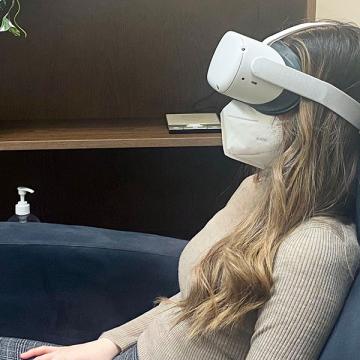
Virtual reality innovation in exposure therapy
What do you think of when you hear “virtual reality”? Virtual reality...
How do you support 3,000 health professional students to build collaborative competencies? This is the challenge our Integrated Curriculum Facilitators take on.

|

|

|
| Kathy O'Flynn-Magee, School of Nursing | Jo Billows, IndigenEYEZ | Kim Campbell, Midwifery Program |
Faculty, Clinical Faculty, and community members dedicate their time and passion to help facilitate eight interprofessional workshops delivered by UBC Health as part of our Integrated Curriculum. We caught up with Kathy O’Flynn-Magee from the School of Nursing, Kim Campbell from the Midwifery Program, and Jo Billows from IndigenEYEZ to find out about their experience as one of the dozens of facilitators who make this learning possible. All three generously shared their vision of a healthcare system that is supportive and collaborative, with patient-centered care at the heart of it all.
“I hope that I can be a small part of shifts and changes that are happening that will make health services and the system one that’s kinder and safer for people in my communities.” (Jo Billows)
Our facilitators harness the power of education in supporting this vision.
“I wanted to help our students find common ground across the professions and appreciate the perspective and strengths each brings to the team.” (Kim Campbell)
According to facilitators, the Integrated Curriculum enhances students’ empathy, for themselves and their own profession, and for others working in the health and healing community. Workshops cover: Professionalism, Ethics, Indigenous Cultural Safety, Resilience, Health Informatics, and Collaborative Decision-Making – content areas that benefit from a collaborative approach.
Kathy enjoys using her passion for teamwork to inspire others. She believes the Integrated Curriculum “helps students and invites them to be grounded in their own professional values and the need for them to be able to articulate their role in the healthcare team.” As an instructor in the School of Nursing, she found out about the opportunity to become and Integrated Curriculum Facilitator from her Associate Director and felt it a was a great fit for her. Kathy tells us, “a really important part of it all is that it is key to have representation from each of our faculties. Representing Nursing meant having a voice at the table, feeling our voice is valued, which is very motivating to stay connected, to give input and be supportive.”
An extraordinary piece of the Indigenous Cultural Safety workshops is UBC Health’s partnership with The Centre for Excellence for Indigenous Health (CEIH), and IndigenEYEZ.
“We use creative methods to access conversations in a visceral, embodied way to help open a space a bit different from a typical classroom experience.” (Jo Billows IndigenEYEZ)
According to Jo, the set-up of having an Indigenous and non-Indigenous facilitator is important because having facilitators who model cultural safety helps to guide the process when asking students to reflect on their experiences and biases.
Everyone agrees the best part about facilitating the Integrated Curriculum is the interactions with students and their connections with co-facilitators.
“I hope students feel a connection to their shared vision for practice, education and research as they are exposed to the rich contributions and perspectives of other students in the health programs.” (Kim Campbell)
Facilitators told us about how they felt supported by UBC Health and the other facilitators. They encourage others to give it a try. “Join us!” says Kim.
“Give it a try if you are thinking about it. You will be very well supported, it was a very positive experience. It was helpful to choose to facilitate from a variety of topics. You will be paired with someone experienced more often than not. You will have materials and structure.” (Kathy O’Flynn-Magee).
Facilitator Applications are open until June 15th.